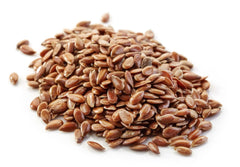9 Best Gut Health Remedies
Posted by Lisa Turner on

1. Fiber
- Fiber is crucial for gut health, normal bowel movements, and elimination of toxins. Most Americans get only half of what they need from food.
- Psyllium husk is rich in fiber to treat constipation, and is safe for long-term use.
- Fiber-rich flaxseeds help treat constipation, especially in people with irritable bowel syndrome (IBS). Add flax slowly to avoid bloating and gas, and take sufficient water.
- Be aware: fiber can impact the absorption of certain medications, so take first thing in the morning away from medications and supplements.
- People with allergies to grass pollen or melon could have allergic reactions to fiber.
Healthy Tip!
Flaxseeds are especially helpful in treating irritable bowel syndrome.
2. Digestive Enzymes
- Digestive enzymes help break down food and aid in digestion.
- Alpha-galactosidase supplements improve the breakdown of legumes.
- Lactose improves digestion of dairy products.
- Specialized enzymes like as dipeptidyl peptidase help break down gluten.
- Protease, lipase, and amylase digest protein, fats, and starches.
- Combination formulas with a variety of enzymes are best for overall digestion.
3. Deglycyrrhizinated Licorice (DGL)
- Derived from licorice root, DGL is used to relieve indigestion, heartburn, and acid reflux.
- It heals and protects the mucosa lining the GI tract.
- It contains flavonoids that protect against H. pylori, a common cause of ulcers.
- Unpurified, licorice can have side effects and may contribute to high blood pressure. Use DGL licorice—this form does not contain glycyrrhizin, the compound that causes some side effects such as high blood pressure.
4. Ginger
- It relieves nausea, vomiting, and morning sickness, and is safe for use in pregnancy.
- It can work as well as Dramamine against symptoms of motion sickness.
- It prevents gastric ulcers caused by H. pylori and NSAIDs.
- It aids in digestion by stimulating gastric motility and the production of enzymes.
- It has anti-inflammatory and antioxidant effects.
5. Peppermint
- It improves bile flow to help ease digestion.
- It helps prevent gas, bloating, and flatulence, especially in IBS.
- It acts as an antispasmodic to ease digestive discomfort.
- The enteric-coated capsules pass through intestines, where the oil is then released.
- If you have acid reflux or GERD, use peppermint with caution, as it can exacerbate symptoms.
6. Glutamine
- It’s an amino acid found naturally in the body.
- It supports and heals the digestive tract, especially the intestines.
- It preserves the gut barrier function and also helps protect the gut epithelial tissues.
- It may help relieve diarrhea.
- It’s especially useful for IBS and leaky gut syndrome.
7. Essential Fatty Acids
- They support nutrient absorption and the membrane integrity of the intestinal tract
- Omega-3s work with gut microbiota to maintain intestinal wall integrity.
- They may benefit IBS by reducing inflammation.
- They help promote bacterial diversity in the gut.
- Take them in a specific balanced ratio of omega 3, 6, and 9 fats in a ratio of 4:1:1.
8. Probiotics
- These healthy microorganisms restore balance to the intestinal microbiome and reduce chronic low-grade inflammation.
- They protect against GI infections, inflammatory bowel disease, and IBS.
- Probiotics reduce diarrhea, especially antibiotic-induced diarrhea.
- They prevent constipation, especially in older adults and those with chronic constipation.
- They improve digestion and nutrient absorption.
- Probiotics maintain overall health of the GI tract.
9. Traditional Herbs for Healthy Digestion
Tap into the wisdom of plants to heal stomach problems and other digestive issues. Here are a few:
- Fennel seed: This herb is a safe, traditional remedy for bowel irregularities and spasms.
- Chamomile: It’s an antispasmodic herb that soothes the digestive system.
- Gentian root: This herb and other bitter botanicals support digestive activity.
- Slippery elm: This ancient herb soothes inflamed and irritated GI mucous membranes.
- Triphala: This Ayurvedic herb promotes the health of the gut epithelium and villi. It also helps ease constipation.
Written by Lisa Turner for Better Nutrition and legally licensed through the Matcha publisher network. Please direct all licensing questions to legal@getmatcha.com.








